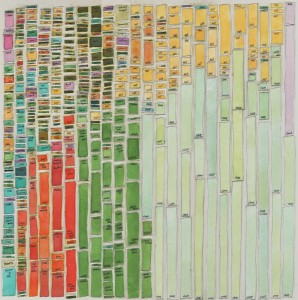5 questions
/5 questions from Paul van den Bosch who writes for Second Sight blog in the Netherlands 1. Why are you so interested in measuring yourself?
I was interested in the notion of little bits of time, and why we jump from one thing to the next and began trying to capture a little diary of how I spent my time. And realized its unbelievably difficult. I started measuring my sleep cycles as an easier…almost automatic way to measure how I spent my sleep (and yes, it’s all little 5 and 10 minute bits of time), and simultaneously found Ben Lipkowitz online who measured how he spent his minute-by-minute time for the past 7 years. Was curious about the subliminal, underlying metrics of a person. Like a data portrait measured and captured of you.
2. In your TEDtalk you talked about data patterns helping to understand ourselves: have you already discovered things about yourself? And was that after you analyzed the data or after you created your artworks?
My idea is that innate patterns of behaviour and body function are like an individual fingerprint. Your heart rate, sleep patterns, walking and travel patterns, speech patterns, food you eat…literally everything you start to imagine that can be measured creates a portrait of you. You have an individual rhythm that’s particular to you and can also be a reflection of your personality. For example, my sleep patterns are pretty steady, I have a very low standard deviation of my sleep score, versus my husband whose sleep score swings wildly. I realized it was a reflection of both our personalities.
My process is to analyze and create, analyze and create, test something, throw it away, do it again, analyze and create….you get it.
3. How do you see the future of Quantified Self / measuring ourselves; for example do you think that measuring ourselves will become common? Will everybody then become a data analyst, peering over his spreadsheets and dashboards, trying to make sense of all these data?
I think self-tracking will become invisible, and embedded into apps that we use and don’t even think about. No, we won’t pour over spreadsheets, but self-tracking data will be pervasive… for example - our clothes will have sensors that know how much we moved our arms and legs, and thus will send accurate data about our caloric expenditure to our Fitbit or fuelband dashboard. Our watch will track our heart-rate-variability and give us little stress alerts. And my best fantasy is that all our data is turned into patterned wall texture that is spit out from a 3D printer in the walls of our home. Recyclable, updatable. Human data portraits as art on our walls….mindfulness made tangible.
4. What would you like to measure / investigate, that is currently not possible?
It is incredibly hard to accurately and easily track what you eat. The nutrition, the content and make-up of what you consume would be fantastic to track automatically. I want it to be as easy as how I capture my weight, fat and BMI by just stepping on my wifi scale.
5. Do you think science can learn from / be inspired by (your) art?
Massive braggadocio to think an artist has an effect on scientific research….but here’s my thought. It seems like the work on the human Connectome project to map the pattern of connections in the brain might find there is an innate pattern of you. And it’s a rhythm that is inherently familiar, and repeats itself in many facets of you. And weirdly there is an resonance when you encounter those same patterns in the real world.
I do think big-data research teams can learn from artists on how to deliver data that is addictive, beautiful and something you WANT to look at. Much of the self-tracking data graphics is so literal and dull, they need to ARTIFY the visual presentation of data. Come talk to me ;-).




